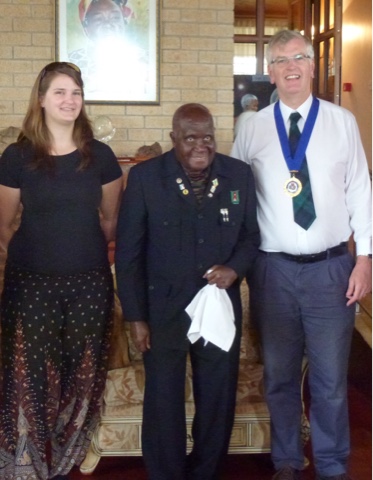In this series of articles I have been telling you about the work my
father and I have done in Zambia with the National Police Aid Convoys. Now I
would like to do something a little different, and tell you how it all started;
with two men born two hundred thousand years apart. Both were born at Broken
Hill in Zambia, and both spent their formative years there, when neither of
them wore shoes. One left with a promise to return, the other stayed there for
all of his days.
One man is my father, the other could be the father of us all.
The Broken Hill Skull, also known as the Kabwe Cranium, was found in a
zinc mine in 1921. It belonged to an adult male, and he belonged to an early
species of human called Homo rhodesiensis. Many believe that H.
rhodesiensis evolved into modern man. For all his significance to us
now, Broken Hill man would have lived simply; eating meat that he hunted with
his spear, using tools that he knapped from flint, socialising with his
extended family unit and speaking with them using a rudimentary language. He
would have known other men who passed through the area on their way into the
rest of the world, but he stayed where he was, happy in his home with all that
he could need.
Sadly there were many dangers in the life of Broken Hill man. His
species spread all over the world, and the remains of another H.
rhodesiensis man have been found in Boxgrove Quarry, West Sussex. They
were gnawed on by a large carnivore. At this time humans were not the top
predator, and while Boxgrove Quarry man was bested by a wolf or a bear, Broken
Hill man would have had to deal with ancestral lions, hyenas, and wild dogs,
not to mention the dangers of hippos, elephants, mosquitoes and tsetse flies.
Disease would have been a constant presence and it is likely that he lost more
than one family member before he himself died. His skull shows that ten of his
top teeth had cavities in them, and pitting in the bone suggests that he
suffered a great infection before he died, either from the infection itself or
from starving to death because it was too painful to eat.
Two hundred thousand years later the other man from Broken Hill is
returning to the land of his birth, now able to heal the hurt that tooth decay
can cause. He is too late for Broken Hill man, but he can help hundreds of
others by providing a facility to which anyone may come for help. My father is
in the process of furnishing a dental clinic in Lusaka to give something back
to the country which gave him so much.
First published in Southwell Life, June 2015.
July's edition of Southwell Life is published tomorrow. Be sure to take a look at all of its fine articles!
July's edition of Southwell Life is published tomorrow. Be sure to take a look at all of its fine articles!



